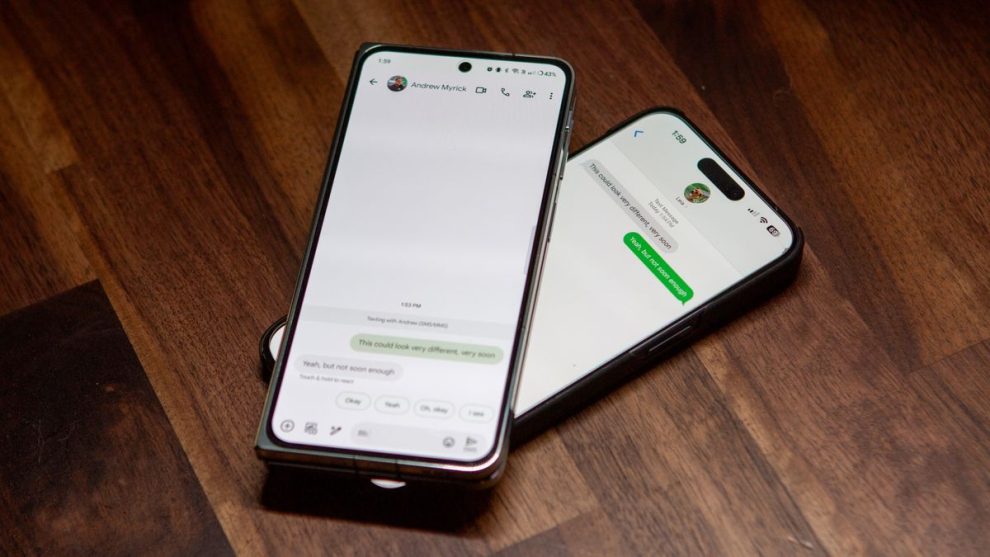Google has taken a swipe at Apple’s long-awaited implementation of RCS (Rich Communication Services) in iOS 18. As millions of iPhone users worldwide update their devices, the tech giant’s criticism highlights ongoing issues with cross-platform messaging security and functionality.
Standing in the bustling Apple Store on Fifth Avenue, New York, I watch as eager customers update their iPhones to iOS 18. The air is thick with excitement, but there’s an undercurrent of confusion about the new RCS feature. I thought this was supposed to fix texting with my Android friends,” says Sarah, a 28-year-old graphic designer, frowning at her screen.
Google’s Playful Jab at Apple’s RCS Implementation

Just days after the iOS 18 release, Google launched a clever video ad featuring anthropomorphized Pixel and iPhone devices. The Pixel quips, “Now that iPhone finally has RCS, we have a breakthrough,” to which the iPhone sheepishly replies, “Even though I know I still have work to do.
This lighthearted exchange belies a serious issue: the current implementation of RCS on iOS 18 lacks the full end-to-end encryption users have come to expect from modern messaging apps.
Security Concerns Cast a Shadow Over RCS Excitement
Tech analyst Mark Thompson explains, “While RCS is a step in the right direction, it’s not the secure messaging panacea many hoped for. The lack of end-to-end encryption is a significant drawback in today’s privacy-conscious world.”
Indeed, The Washington Post recently warned that RCS leaves “chats with Android friends still [with] security and other compromises that Apple could have avoided.”
Both Google and GSMA, the mobile standard-setter, have promised that end-to-end security is on the horizon. However, no specific timeline has been provided, leaving users in a state of uncertainty.
As Apple and Google trade barbs, Meta’s WhatsApp has been quick to capitalize on the situation. Mark Zuckerberg, Meta’s CEO, recently celebrated WhatsApp surpassing 100 million US users in July 2024.
WhatsApp offers what RCS currently can’t – seamless, fully secure cross-platform messaging,” says Emily Chen, a social media strategist. “They’re positioning themselves as the solution to the very problem Apple and Google are still grappling with.”
Indeed, WhatsApp’s latest ad campaign prominently features its end-to-end encryption, directly addressing the security concerns surrounding RCS.
This public spat between tech giants raises questions about the future of mobile messaging. Signal, another secure messaging app, has seen increased interest but faces usability challenges.
Transferring Signal data to a new phone can take hours,” laments Tom, a cybersecurity professional I met at the store. It’s secure, but not as user-friendly as WhatsApp or iMessage.
While Google’s ad is clever, some industry insiders question the wisdom of mocking Apple’s RCS implementation. “Google has more to lose here,” explains Thompson. “They’ve been pushing for RCS adoption for years. Criticizing it now could backfire if it discourages users from embracing the technology.”
Google’s own messaging platform, Messages, has struggled to achieve the same level of popularity as iMessage or WhatsApp, particularly in the US market.
As the dust settles on the iOS 18 release, it’s clear that the messaging landscape is still evolving. Apple’s adoption of RCS, while significant, hasn’t fully bridged the gap between iOS and Android users.
“What we’re seeing is just the beginning,” says Chen. “The pressure is now on both Apple and Google to improve RCS security and functionality. Users are demanding seamless, secure cross-platform
As I leave the Apple Store, the buzz of excitement is tempered with a sense of anticipation. The implementation of RCS on iOS 18 is undoubtedly a step forward, but it’s clear that there’s still work to be done.
For now, users are left to navigate a complex messaging landscape, balancing security, functionality, and cross-platform compatibility. As Apple and Google continue to refine their approaches, and competitors like WhatsApp seize opportunities, the future of mobile messaging remains an intriguing and evolving story.
















Add Comment